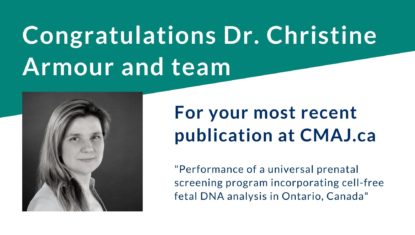04/08/2021
Ottawa, Ontario — Wednesday August 4, 2021

A new Prenatal Screening Ontario study, led by Dr. Christine M. Armour and powered by BORN data from hundreds of thousands of pregnancies, was published in the August 3 issue of Canadian Medical Association Journal.
The study evaluated the performance of Ontario’s prenatal screening system for the detection of trisomy 21 (Down syndrome) and trisomy 18, and tracked the prenatal testing choices of pregnant individuals.
This study demonstrates that pregnant Ontarians have access to a robust, high-quality prenatal screening system that reduces invasive prenatal diagnostic testing and supports informed decision making.” BORN Ontario
Take a look at the visual infographic HERE!
Accessible version:
Performance of Prenatal Screening for Aneuploidy
A population-based study examining routinely collected data from BORN Ontario, the province’s perinatal registry.
What
Measure the performance and impact of Ontario’s prenatal screening system for aneuploidy after the incorporation of cfDNA testing, also known as NIPT (which measures placental DNA circulating in the blood of the pregnant person).
Where
In Ontario, pregnant individuals are offered publicly funded multiple marker screening (which includes measuring hormones from the blood, and other information). Publicly funded cfDNA screening is available to those with an increased chance of having a pregnancy with certain aneuploidies, like trisomy 21 (Down syndrome) or trisomy 18.
Who
Data from 373,682 singleton pregnancies with a due date between Sept 1, 2016 and March 31, 2019, that were offered publicly funded prenatal screening.
Why
Evaluating real-world prenatal screening system performance is important for making improvements to the system and supporting decision making for pregnant individuals.
Key findings
- Prenatal screening is a choice. The offer of prenatal screening was accepted for 69.9% of all singleton pregnancies
- 2.4% of all screened pregnancies underwent prenatal diagnosis. There was nearly a twofold decrease in prenatal diagnosis since the introduction of cfDNA screening.
- The overall sensitivity of prenatal screening for trisomy 21 was 89.9%. The overall sensitivity of prenatal screening for trisomy 18 was 80.5%
- The overall sensitivity of prenatal screening for trisomy 21 was 98.8%. The overall sensitivity of prenatal screening for trisomy 18 was 99.9%.
- Sensitivity refers to the proportion of pregnancies with trisomy 21 / trisomy 18 that received positive screening results.
- Specificity refers to the proportion of pregnancies without trisomy 21 / trisomy 18 that received negative screening results.
- 65.2% of pregnancies with a screen positive cfDNA result had invasive prenatal diagnostic testing. Pregnant people continue to make individual decisions about prenatal testing.
Conclusion
This study demonstrates that pregnant Ontarians have access to a robust, high-quality prenatal screening system that reduces invasive prenatal diagnostic testing and supports informed decision making.
Reference
Dougan SD, Okun N, Bellai-Dussault K et al. Performance of a universally offered prenatal screening program incorporating cfDNA in Ontario, Canada: a descriptive population-based cohort study of 280,000 pregnancies,CMAJ2021. DOI: https://doi.org/10.1503/cmaj.202456.
